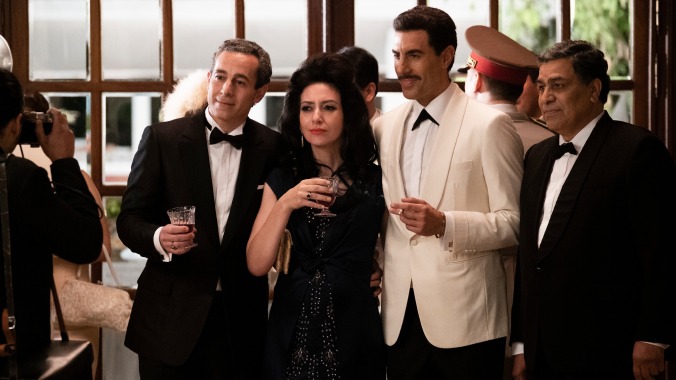Sacha Baron Cohen plays it straight in Netflix’s wild true-life tale of The Spy


It’s rare that any adaptation of a true-life story for the big or small screen doesn’t get goosed a little in the process of translation, as those tasked with bringing the tale to life can’t resist juicing the actual history with some dramatic thrills above and beyond the facts. That this happens in The Spy, Netflix’s new limited series recounting the narrative of Israel’s most famous undercover agent, isn’t surprising, but it is—more than most—wholly unnecessary. The life and times of Eli Cohen, and his years-long infiltration of the highest reaches of the Syrian government and military, is already a belief-beggaring series of events, deeply compelling and frequently outlandish. No flights of fancy were needed.
Then again, with writer-director Gideon Raff (creator of Prisoners Of War, the original Israeli version of Homeland) responsible for the entire endeavor, the appealing nature of the fictionalized elements can’t be denied. Raff has a craftsman’s eye for when to add a little extra spice to this historical drama, and the scenes where he imagines Cohen’s spy heroics deep inside Syria’s military and political machinery make for enjoyably pulpy additions, albeit ones that unfortunately blur the lines between the all-too-real acts of cunning Cohen executed during his time undercover.
And in the tale of Israel’s legendary spy, Raff has some wild source material. Cohen, an Egyptian Jew who resettled in Israel following his activist work helping to get other Jews out of his birth country due to rising anti-Semitism, was recruited by Mossad in 1960 to pose as a Syrian businessman returning to the country after living in Argentina. Following months of undercover life merely to establish his cover, Cohen—now going by the name Kamel Amin Thaabet—was able to insinuate himself into the world of high-ranking Syrian officials, in the process gathering invaluable intelligence he would pass along via secret radio transmissions, letters, and more. Some of his achievements are truly of the stranger-than-fiction variety, such as his uncovering of the secret underground Syrian fortifications in the Golan Heights, the locations of which he was able to precisely convey to Israel by using faux concern for the overheated Syrian soldiers as a pretext to plant eucalyptus trees at every outpost. Before his capture (the series opens with this information, so there’s no need to fear spoilers for decades-old and easily Google-able history), he had risen so high that he was reportedly being considered for the position of Syria’s Deputy Minister Of Defense.
For his partner in bringing this story to life, Raff found an ideal collaborator in Sacha Baron Cohen, a man with not inconsiderable experience disappearing into fictional alter egos in the real world. Here, the performer silences his comedic side and stolidly slides into the skin of Eli/Kamel, a man overeager to take risks in the name of proving himself to his adopted homeland. It’s a strong, understated performance, and the Brit successfully evokes both the steely determination and occasionally clumsy enthusiasm of the spy with nuance and gravity. Noah Emmerich, as Eli’s Mossad handler Dan Peleg, similarly delivers a soulful turn, albeit one somewhat hampered by a wobbly Israeli accent.
But there’s an equally engrossing—and potentially richer—story of everyday human drama captured by Raff’s camera, as it continually returns to Eli’s wife, Nadia (a superb Hadar Ratzon Rotem). The spouse and mother is kept in the dark, believing her husband to be a furniture buyer traveling abroad for the government. The emotional toll taken as Eli leaves for upwards of a year at a time, largely unable to communicate, missing the births of his children, makes for stirring drama, to the point where it increasingly becomes a welcome shift whenever attention moves away from Eli’s high-wire espionage and back to the lonely domestic world of Nadia. (At one point, she captures the transformation of her circumstances by telling Eli’s boss, “By making his dreams come true, you’ve ruined mine.”)
But some of the reason for the allure of Nadia’s story is in the too-stolid development of Eli’s adventures. The first half of the series unfolds with rote, almost predictable beats familiar to anyone who’s seen a few movies about eager new spies getting in over their heads. Likewise, Raff’s script never tries to dig into the moral complexities of the situation; Eli is nothing but a devout servant of Israel struggling to do the right thing, even when it puts him in greater jeopardy. The Spy could’ve used some of the ambiguities of Emmerich’s last series, The Americans. It borders on hagiography at times, and in odd ways: Raff paints Eli as a dedicated husband who resists the allure of Kamel’s high-flying ways until he’s essentially forced into certain acts to maintain his cover, whereas the real Eli Cohen reportedly embraced his alter ego’s bachelor life with gusto. The series seems almost embarrassed whenever it has to portray Eli in a less-than-flattering light, and that reticence detracts from the drama.
Still, the narrative accelerates around episode four, as Raff injects an increasing sense of claustrophobia and intensity to Eli’s deceptions. Whereas some early chase sequences suffer from a lack of coherent spatial geography, later moments of action are styled in a manner that uses Eli’s lack of knowledge to their advantage, plunging the viewer into a world where there’s no clear path to safety. There’s an unavoidable element of propaganda to the story—even the Mossad higher-ups, perfectly happy to put their own citizens’ lives at risk, are noble servants of a benign state—but Raff minimizes the rah-rah cheerleading, at least until the end. The Spy never quite manages to rise to the level of its excellent lead actors, but ends up being a satisfying depiction of one of the more unusual success stories of international espionage.